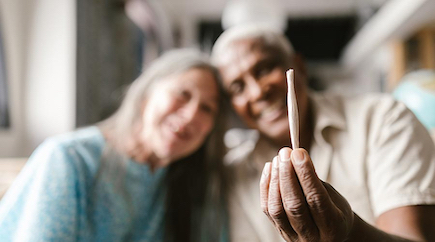A 2020 survey study entitled "Cannabis: An Emerging Treatment for Common Symptoms in Older Adults" that was published in the Journal of the American Geriatrics Society observed that cannabis use is increasing across multiple populations in the United States and explored how and for what reasons the herb is consumed among the senior population.
The design of the study was that of an anonymous survey conducted in a geriatrics clinic involving 568 adults, all of whom were at least 65 years old.
Fifteen percent of those who responded to the survey (85 participants) reported cannabis use during the previous three years. Thus, 85 percent (483) of those who responded had not used marijuana during that same period.
Of those who reported cannabis use, about half (53 percent) said they used it on either a daily or weekly basis. Slightly less than half of the marijuana consumers (46 percent) said they also use cannabidiol (CBD)-only products lacking delta-9 THC.
The majority of cannabis-using respondents said they use it "for medical purposes only." The most common conditions treated using medical cannabis included:
More than 75 percent of cannabis consumers labeled their use "somewhat" or "extremely" helpful in managing their condition(s) and reported few adverse side effects.
About half of the survey participants who consumed cannabis indicated that they obtained it from a licensed dispensary. The most common consumption avenues were topicals (lotions) and sublingual tinctures, which tied with 35 percent of cannabis-using participants indicating the use of each. Smoking was a close second, with 30 percent of the canna-friendly senior community reporting that they leveraged this avenue.
The vast majority of marijuana-consuming participants (94 percent) indicated that their family members were aware of their use. Fewer were willing to tell friends about their consumption, with only half reporting that they had. An even lower percentage of survey participants gave full disclosure to their healthcare provider of their use of marijuana, with only 41 percent reporting that they had done so.
Of the cannabis users who responded to the survey, 61 percent said they used it for the first time after the age of 60. Survey responses also indicate that seniors engaged in "less risky use patterns," meaning that they were more likely to use topicals and tinctures and less prone to smoke loose-leaf flower or dab concentrates. Seniors are also, according to this survey, much more likely to consider their consumption medical and not recreational.
The survey found that of those who consumed cannabis, most had begun this use after the age of 60 and that they considered their consumption to be for medical purposes. The most commonly treated conditions among survey respondents who used marijuana were anxiety, depression, pain, and sleep disorders.
Read More, Learn More: Higher Learning LV




















